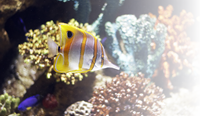|
|
DAN CoursesAs a recreational diver, you can receive training to provide vital first aid that can make a difference to a scuba diver with decompression illness. The DAN Oxygen Provider Course provides entry-level training in the recognition and management of possible diving-related injuries using emergency oxygen first aid.
This advanced-level program is designed to train existing DAN Oxygen Providers to use the MTV-100 or a Bag Valve Mask while providing care for a non-breathing injured diver.
Oxygen First Aid for Aquatic Emergencies This course trains non-divers and professional rescuers (such as lifeguards) to recognize near-drowning / submersion incidents and other aquatic medical emergencies and to provide basic life support including the use of oxygen first aid.
Serious hazardous marine life injuries are rare, but most divers experience minor discomfort from unintentional encounters with fire coral, jellyfish and other marine creatures. This course teaches divers to minimize these injuries and reduce diver discomfort and pain.
More than 10 percent of all dive fatalities are actually caused by cardiovascular disease, according to DAN dive accident and fatality statistics. This course teaches divers and other interested parties to provide care for sudden cardiac arrest including the use of an automated external defibrillator (AEDs).
When a person drowns, they may or may not inhale water. They normally enter cardiac arrest because of the inability to breathe. This course teaches interested parties to provide care for cardiac arrest by using an automated external defibrillator (AED).
The remote nature of dive accidents, whether a few hours from shore or days from civilization, frequently requires more advanced levels of care than are offered by traditional or entry-level CPR programs.
The DAN Remote Emergency Medical Oxygen (REMO2™) system module supplements the DAN Oxygen First Aid in Scuba Diving Injuries course. Based on medical closed-circuit oxygen rebreather technology, the REMO2™ device provides injured divers with high concentrations of emergency oxygen for extended periods. This training course instructs the Oxygen Provider in the use of DAN's new REMO2™ system.
Learn the knowledge and skills from several courses into one single approach to dive emergency management.
Learn about DAN’s new recognition program for divers who are interested in dive safety.
Neurological Examination Learn how to conduct a neurological assessment on a potentially injured diver in this course. The information gained in this assessment can help convince a diver of the need for oxygen first aid, and help a dive physician determine the proper treatment.
Dive Accident First Aid for Non-Divers This program is designed for nondivers and teaches them how to recognize the warning signs of decompression illness and help provide care for a diver involved in a dive emergency.
Dive Medecine for Divers - NEW Program!! This new modular program includes sections on fitness to dive, safety planning, decompression illness, barotrauma, gas toxicities, equipment-related problems and diving maladies that aren’t pressure-related. The first three modules are:
|






